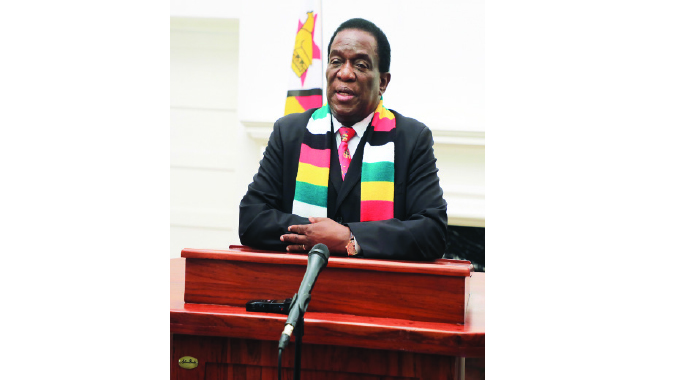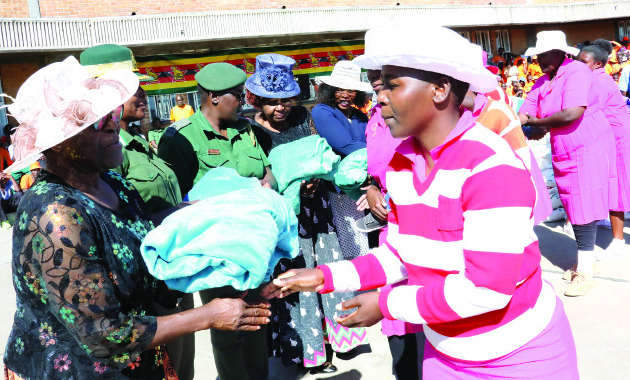PromisEDelivered

Nduduzo Tshuma, Assistant Editor
TODAY marks four years since the inauguration of President Mnangagwa as Head of State giving birth to the Second Republic which has made strides in turning around the country’s fortunes towards collective prosperity.
In his inauguration speech at the National Sports Stadium in Harare, President Mnangagwa said Zimbabwe was on a path of renewal.
“Today the Republic of Zimbabwe enters the second phase of its birth. We emerge to fully affirm our belonging to the family of nations,” he said.
The President declared that the toxic politics that had characterised the ruling Zanu-PF that set off a chain of events that led to the resignation of former President, the late Cde Robert Mugabe should never happen again.
“I implore you all to declare that NEVER AGAIN should the circumstances that have put Zimbabwe in an unfavourable position be allowed to recur or overshadow its prospects. We must work together, you, me, all of us who make up this Nation,” he said.
Under his leadership, Government has retained stability and abandoned toxic and divisive politics championed by the G40 cabal.
The President said he was touching the ground running to work towards returning Zimbabwe to her glory days, part of which was opening up the country for business.“I stand here today, to say that our country is ready for a sturdy re-engagement programme with all the nations of the world.”
Mutual beneficial relations have been a premise for the country’s re-engagement drive that has seen Zimbabwe strengthening previously existing relations with friendly nations while seeking to mend those that soured over the years.
In that regard, the country has had constructive dialogue with the European Union, which has started bearing fruits, United Kingdom and United States in the quest to restore good relations.
Critically, the President said the recovery of Zimbabwe lay in the hands of Zimbabweans and later in the reign coined the phrase “the country is built by its owners”.
The Second Republic, in its massive infrastructural development exercise, has engaged local contractors for some major projects in the country moving away from the old system of prioritising foreign firms.
The Harare-Beitbridge Highway rehabilitation project and recently the 245 km Lake Gwayi-Shangani – Bulawayo pipeline project are some of the major initiatives awarded to locals.
In adopting a new culture of collective development, President Mnangagwa said no part of the country will be left behind.
“At the end of the day, whatever we do or chose not to do must be intended to benefit all our people,” said President Mnangagwa.
Since the coming in of the Second Republic, there has been activity in all parts of Zimbabwe in terms of development projects.
While seeking to complete some outstanding projects from the previous administration like the Lake Gwayi-Shangani, Matabeleland North Provincial Hospital and others, the Government has initiated a number of projects countrywide in line with the President’s promise.
In Matabeleland in particular, never before have there been a number of high projects running at the same time like during the reign of the Second Republic.
On the issue of land, President Mnangagwa said: “My Government is committed to compensating those farmers from whom land was taken, in terms of the laws of the land.”
In July last year, President Mnangagwa presided over the signing of the US$3,5 Global Compensation Deed where 4 000 white commercial farmers who lost their farms during land reform will be compensated for improvements on the properties.
The President challenged beneficiaries of the land reform to prove that they deserved the resource by being productive while calling on them to utilise Government programmes to ensure optimal use of the land.
In the last farming season, the country recorded a bumper harvest owing to good rains coupled with Government support to the sector that has seen it almost achieving its US$8,2 billion agriculture economy target in one season.
The country is positioned to beat the target following the launch of the Agriculture and Food Systems Transformation Strategy by President Emmerson Mnangagwa last year.
The agrarian transformation plan of action was drawn from the Agriculture Recovery and Livestock Growth Plan, which outlines specific key projects that include the provision of inputs to both vulnerable and smallholder farmers, fostering market links, climate-proofing all agriculture support programmes, among others.
On the economy, the President said the country’s quest for development must be premised on a goal to establish and sustain a just and equitable society based on the country’s historical, cultural and social experience, as well as aspirations for better lives for all people.
“The bottom line is an economy which is back on its feet, and in which a variety of players make choices and fulfil roles without doubts and in an environment shorn of fickle policy shifts and unpredictability,” he said.
The economic reforms implemented by the Second Republic have seen official estimates indicating that the country’s Gross Domestic Product (GDP) growth is expected to hit 7,8 percent by the end of this year, slightly above earlier estimates of 7,4 percent.
While this hinges on the recovery of the agricultural sector, other key sectors of the economy like the mining and manufacturing are on the rise.
Because of the good economic policies, the country has for the first time recorded a budget surplus while the adoption of the Zimbabwean dollar has restored confidence in the economy.
One of the principles most cherished by President Mnangagwa right from the beginning of his reign is unity.
“The values of Unity and Peace cherished by all Zimbabweans are the enduring foundations for the desired goal of development, itself the third pillar of the trinity of Unity, Peace and Development espoused by my Party, Zanu-PF,” he said.
On many platforms, the President has emphasised that development can only be realised in a peaceful and tranquil environment.
This saw the President presiding over engagements to bring finality to the Gukurahundi issue, one of the country’s darkest periods.
Through recognising and celebrating the country’s collective history, the Second Republic has honoured eminent people across the country who, in different historical epochs, contributed to the liberation and development of the country.
Post the 2018 elections, President Mnangagwa set up the Political Actors Dialogue (Polad) a platform for political parties that took part in the polls to engage on issues to do with the development of the country.











Comments